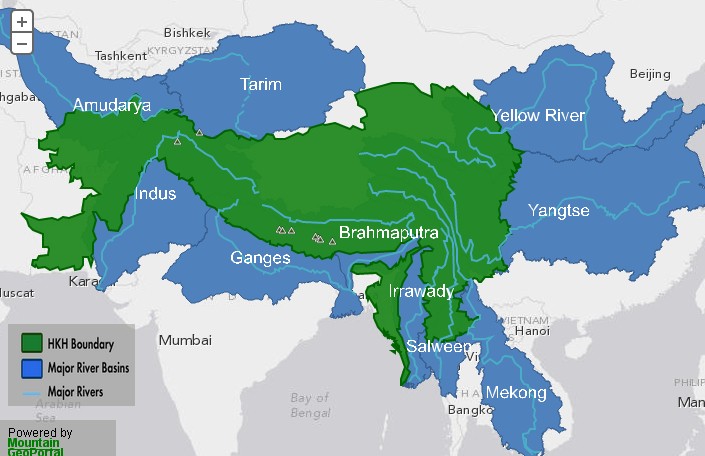
Scientists and policymakers from China and 18 other countries met in Kathmandu, Nepal last week to discuss improving the lives of poor people in the Hindu Kush Himalayas (HKH) mountain region of southern Asia.
Four representatives of the Chinese Academy of Sciences (CAS) joined with other Chinese researchers at the International Conference on Addressing Poverty and Vulnerability, which was held from Dec. 1-4. Attendees discussed how to apply scientific evidence to poverty alleviation in the region and how to expand pilot poverty alleviation projects into full-scale programs. They also discussed how to improve collaboration against the background of looming global climate change.
 |
| The Hindu Kush Himalayan (HKH) region is the source of ten large Asian river systems and provides water, ecosystem services, and the basis for livelihoods to a population of around 210.53 million people in the region. The basins of these rivers provide water to 1.3 billion people, a fifth of the world’s population. (Image by ICIMOD) |
The conference was jointly held by the International Centre for Integrated Mountain Development (ICIMOD) and the National Planning Commission (NPC) of Nepal.
The HKH region comprises about 340 million square kilometers stretching across eight countries including China, which has about 16.5 million square kilometers of HKH mountain area. On average, poverty is about five percent greater in the HKH region than in other parts of these countries.
The conference recommended creation of a mechanism for science and policymakers to jointly design research agendas and policies to combat poverty.
Dr. Lynn Bennett, a visiting scientist at the International Centre for Integrated Mountain Development, said at the conference that “the voice of science is often not heard strongly enough at the policy level.”
China has been working hard to apply science and technological solutions to development in mountainous areas, said Dr. WEI Fangqiang, vice director of the Institute of Mountain Hazards and Environment of the Chinese Academy of Sciences (CAS).
“The government of China has taken concrete steps to balance the disparity between western mountainous areas and eastern coastal areas, through dissemination of knowledge, infrastructure, environmental protection and disaster risk reduction,” WEI said at the conference.
CAS is playing an important role in the effort to improve China’s mountainous areas. In March, CAS’s Academic Division initiated a consulting project on development strategies for such areas.
Some of the most serious problems affecting mountainous regions in and outside China include environmental degradation, the results of climate change, exploitative mining, poverty, hunger and lagging economic development.
Chinese scientists and policymakers have proposed numerous solutions, including ecological protection, appropriate resource exploitation, population migration, industrial development, improved education resources, integrated water resource management and poverty relief.
ICIMOD, headquartered in Kathmandu, was founded in 1983. As a regional intergovernmental center, it serves the eight member countries of the HKH Region– Afghanistan, Bangladesh, Bhutan, China, India, Myanmar, Nepal and Pakistan. ICIMOD aims to encourage partnership among member countries and partner institutions to help people in the HKH region cope with globalization and climate change.

86-10-68597521 (day)
86-10-68597289 (night)

86-10-68511095 (day)
86-10-68512458 (night)

cas_en@cas.cn

52 Sanlihe Rd., Xicheng District,
Beijing, China (100864)

